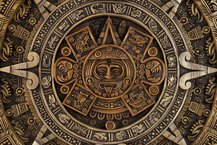Doomsday
Before the years leading up to 2012, Mayan astrology had taken something of a back foot and was not being so widely practised. Among astrology circles, however, it has always been well respected. But it was the approach of 2012 that caused people to once again pay attention to the Mayans’ unique calendar.
There is actually more than one Mayan calendar, the most famous being the Long Count calendar, which had an end date of December 21, 2012. Unfortunately, this date was interpreted as being a prediction of the end of the world, gaining international fame as the date approached.
However, this was actually an incorrect interpretation, but the famous mistake is now regarded as an inaccurate prophecy foretold by the Maya. It was archaeologists who made this presumption, and the Mayans themselves never actually predicted such an apocalypse. Instead, the Long Count calendar is a repeating cycle of around 5125 years, meaning 2012 was simply the year that this calendar would reset.
When exploring Mayan astrology, it important to first note that this famous inaccuracy was not so.
Difference to Western Astrology
If you have an awareness of the ins and outs of Western astrology, you may be surprised at the difference to Mayan astrology. It is true that the location of the stars remains constant, as you may expect. However, the names and methodology used to interpret these celestial bodies are quite different, as their calendar is operating from a totally dissimilar culture.
One of the main differences is the time period covered. Western astrology is based on the twelve zodiac signs spread over a 365 day period. However, through a calendar named the ‘Tzolkin’, Mayan astrology has the potential for 260 different possible signs, covering a 260 day cycle.
Mayan astrology is always basing its insights on the Tzolkin, while Western astrology is about redrawing the charts required based upon the Gregorian calendar.
The Tzolkin
Mayan astrology is based upon the Mayan calendar, of which there are more than one. However, the most commonly used for astrological reasons is the Tzolkin.
Sometimes known as the Sacred Round, the Tzolkin is an infinite calendar. Rather than being grounded upon how celestial bodies orbit the sun, it focuses on the universal energy of the cosmos. According to Mayan philosophy, to lead a harmonious life one must comprehend and attempt to join with this cosmic energy.
The Tzolkin functions around a 260-day cycle, of which there are 13 sections of 20-day increments, known as ‘solar tribes’. Every single day is assigned not only its own personal sign, but also a number from 1 to 13 which represents the moon’s location, and allows a reader to gain a greater understanding of the seeker’s characteristics.
The Life Tree
One fundamental aspect of Mayan astrology is the ‘Life Tree’. This philosophy states that, although every individual has a core sign which denotes specific energy, there are also other cosmic energies actively influencing the person. This concept is similar to the birth chart in Western astrology, offering various other factors with which to assess the individual, making for a huge number of possible outcomes. The life tree represents all of the branches of energy that can flow into us from numerous universal locations, past present, and future.
Haab Astrology
As mentioned earlier, Mayan astrology uses more than one type of calendar. While the Tzolkin is most famous and most commonly used, it is worth mentioning the Haab.
This is a 365 day calendar, used to reflect the Gregorian calendar used throughout the western world. This calendar is much less commonly used by the Maya, as the Tzolkin was always regarded as their most sacred and spiritual of calendars.
However, the Haab can be used for astrology. The main benefit of the Haab over the Tzolkin is that one can use it to create astrological day glyphs. These can be useful for making more specific predictions and glean greater knowledge of the universe on a specific day.
What is Your Mayan Sign?
Working out your Mayan astrological sign can be a little more challenging than in Western astrology. The first thing you will need to find out is your birthday!
Mayan calendars are very different from our Western one, and so before you can assess your Mayan sign, you must begin by learning your date of birth on the Mayan calendar. This can be extremely challenging, but luckily with the advent of computer power, one can simply use an online tool to figure this out.
Once you have found your birth date you can learn your Mayan sign. The process then becomes very similar to Western astrology, with each of the twenty signs representing different characteristics and personality traits.
Scratching the Surface
These twenty Mayan astrology signs that we can find in the Tzolkin calendar are only the very surface of what can be learned. There is a multitude of new signs and aspects of the cosmos which can be used to combine with old signs to create new meanings and reach new levels of understanding. Indeed, it can take a lifetime to master Mayan astrology. But even then, you most likely would not be in possession of all the ancient knowledge, as much of it has been lost to time.
We have selected the most relevant psychics for this article, you can connect with any of them and get accurate advice on this subject.









